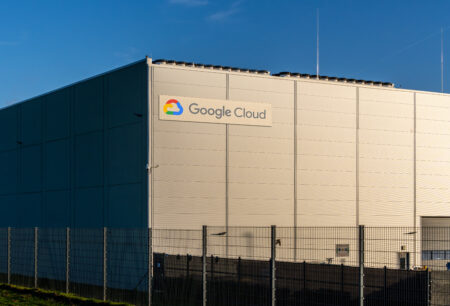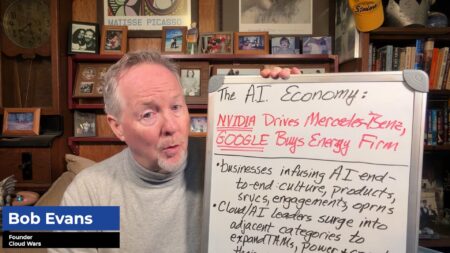
Because Frank Slootman typically scores a 15 on a scale of 1-10 for speaking directly, I paid particularly close attention when he recently said “I can’t overstate my optimism” about artificial intelligence (AI) and that “we’re at a great, great place in history.”
That perspective stands out not only because of Slootman’s legendary record in the tech industry but also because he has positioned Snowflake beautifully for the generative AI (GenAI) Revolution via its specialization in and around the world-shaping fuel of that revolution: data.
And as business leaders understand more completely that the foundation of AI is data, Snowflake will be only too eager to help.
“There’s definitely a sense of FOMO [fear of missing out] and leaders are feeling pressure to show their boards that they’re working on it and making progress,” Slootman said in our recent video interview for this CEO Outlook 2024 series. (You can see that exclusive interview here.)
“But at the same time, technology is technology — you don’t just turn it on.”
So despite the burning desire among business executives to demonstrate some progress and build momentum, most are finding that while the spirit is willing, the data muscles are woefully undeveloped.
Ask Cloud Wars AI Agent about this analysis
“People are incredibly infatuated with the potential and the possibilities,” Slootman said, presaging the exact feeling that he himself expressed at the end of our interview.
“But now, the reality is setting in that this is a journey. And part of that journey is really getting your data estate in order, which is obviously where we’ve been from day one. There’s simply no AI strategy without an enabling data strategy to support it, and people are starting to understand that if you’ve got garbage going in, then the output won’t be that good either,” Slootman said.
“So Snowflake customers are in a really good position to enable themselves. Why? Because they’ve been doing the right things all along — and maybe with regard to AI that was just by happenstance, but that’s where they are.”
And up comes the Big Question that I believe will determine not only the success or failure of AI projects, but success or failure of entire companies: Where should business leaders focus their AI resources and energy?
“Yeah, I think that’s a really important question,” Slootman said, “because this kind of computing is not free — in fact, it’s going to be quite expensive. So you’ve got to think about, ‘Okay, is this just fun and games and just cool stuff? Or is there a business imperative that drives it?’ “
To underscore that point, Slootman cited the rise of search, which rose to global prominence because Google was able to create revenue streams that supported its ability to turn a new and compelling technology into a quantifiable driver of business value and innovation.
“When search exploded on the scene about 25 years ago, the great thing about search was that it had a business model that enabled it and paid for it, and that’s why it’s scaled to these massive heights and why we rely on it to such extraordinary lengths. To this day, I’m a sort of search junkie — I love it,” Slootman said.
“And so I’m going to be an AI junkie just as much because to me, it’s an evolution of intelligence.”
Slootman is seeing similar trains of thought in his meeting with CEOs, more and more of whom are expecting — in fact, requiring — that their AI initiatives blow past the “fun and games” stage and quickly demonstrate the ability to “redefine or reset the economics” of their organizations.
“CEOs will say, ‘Hey, I want to redefine or reset the economics off some very big boulders that I have in my enterprise. Contact centers are notorious for consuming enormous resources, especially for telcos and banks and government agencies and so on,” Slootman said.
“And at the same time, I obviously want to do something about the service experience, which has been notoriously bad, right? All these these statically hard-coded interactive voice-response systems are just maddening and they’re perfect candidates for becoming not just having co-pilots but for becoming systems that are completely autonomous, right?
“So they can listen to you in natural language and figure out what the hell you want to do, right? So if I want to add a car to my Sirius XM account, how hard should that really be? Today, I have a chat session with a person and it’s pretty good but it’s still a person–and that’s not going to last very long, is it?”
And then Slootman kicked it into high gear by offering a glimpse at why he’s so wildly optimistic about the potential of intelligently designed and deployed AI to go far beyond merely capable and instead will help create experiences that are truly “delightful.”
“These systems won’t just become autonomous — they will become delightful in the experience they deliver and the associated cost will be orders of magnitude less. So people love that,” he said, because that’s the full expression of how AI can not only “reset the economics” but also dramatically boost the customers’ perception of the service experience.
Of course, all these advances with AI will require increasing amounts of data. And Slootman believes that in a fairly short period of time, Snowflake’s customers will be generating and consuming larger and larger percentages of their data from applications, which represents a massive shift from the current state. Along with that, the people doing all that consuming will change dramatically as well because new tools will pull more non-specialists into the action.
“We believe that in the fullness of time, the vast majority of the consumption of Snowflake will be coming from applications,” Slootman said.
“And that won’t come from just data engineers and data scientists and other people that today are really the vast majority of our consumption. The reason is that a big part the population that consumes applications are end users and small businesses. And the numbers of those people —who don’t have sort of data as their middle name — is vastly greater, even orders of magnitude greater, than the core constituency that we historically have served,” Slootman said.
“So data is becoming the tail that’s wagging the dog in a huge way, because it’s going to reverberate through the entire stack and how we do things. And I think that our Data Cloud is going to be far greater in terms of its blast radius and the effects that it will have on computing than just the stuff that we historically have talked about in terms of data warehousing and data operations.”
For Snowflake, the enormous expansion of that “blast radius” will drive a big shift in not only “the stack” as Slootman described but also in the way businesspeople think about the terms “data estate” and “data sharing.” In the past, those have been defined in and around internal terms, such as “perimeters” and “data stores.” But in the data-fueled future of AI, Slootman said, successful companies will adopt a completely different mindset and terminology about data based on business opportunities and outcomes rather than on IT jargon.
“Data sharing has really changed people’s perspective about what data operations really are, because typically databases were confined to an application, but they certainly were confined to an enterprise perimeter,” he said.
“Not too many years ago, I would bring up the subject of data sharing to CIOs, and they looked at me like, ‘What in God’s name would I use that for?’ And now it’s like they’re on a rampage with it because all of a sudden we’re defining data estates not in terms of perimeters but in terms of business relationships and the types of problems that we’re that we’re solving!”
Final Thought: Why Frank Slootman Is so Optimistic about AI
I noted near the top of this piece that Frank Slootman is not prone to fanciful language or trendy buzzwords. And he’s been around the tech industry long enough to know that hype all too often outweighs actual achievement. So when he not only expressed his bullishness and optimism for AI but also explained what business leaders must do to unleash that power, he was offering up some hard-earned and high-value perspectives.
“Oh, I think our customers are gonna go to places where we couldn’t have dreamed of being. Unfortunately, I have seen most of the history of computing firsthand, which is a hell of a long time, and it’s been a very hard, painful slog through the progression of platforms from mainframes and minicomputers and all that,” he said.
“But I would give my left arm to go back to school now with the advantage of search, and you can’t even imagine how great education will be with the onslaught of AI, right? And when you have your own private tutors, and the acceleration that’s going to happen, and how much better people will be able to learn and how much faster they’ll be able to learn.
“So I’m extremely bullish. I don’t even know how bullish to be because there’s, I don’t know, I just can’t overstate my optimism about everything that’s coming. So this is great.
“There’s a lot of anxiety out in the world and it’s certainly to some degree justified and we’re already seeing some examples of that. But every generation of technology has had downside — social media has had downsides, search has had downsides, manipulation of information out there. Yes, that happens,” he said.
“But we’re at a great, great place in history. Computing has been brutally hard, but we’re now on the cusp of bridging that divide between man and machine…. And we’re getting to the place where technology is no longer what is going to hold you up — instead, what’s going to hold you up is your own imagination and to some degree your ability to pay for it.
“And that’s a very different place than where we have been for the last 50 years.”
- Watch the full Frank Slootman interview
- Read my analysis from discussions with Frank Slootman about his 2024 outlook

Register for Acceleration Economy’s Cloud Wars CEO Outlook 2024 Course, now available. Featuring exclusive interviews on strategy, AI, and customers with the CEOs of Cloud Wars Top 10 companies.









